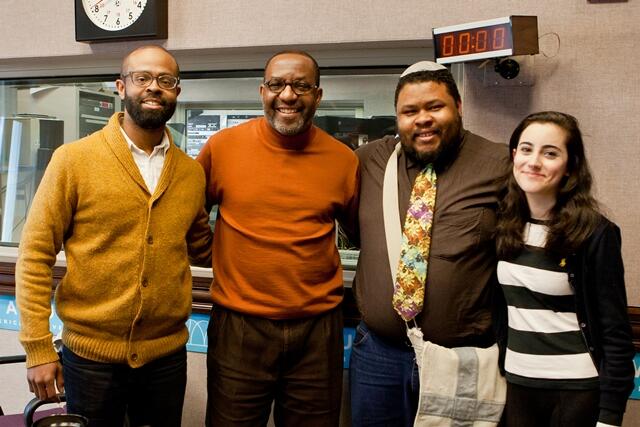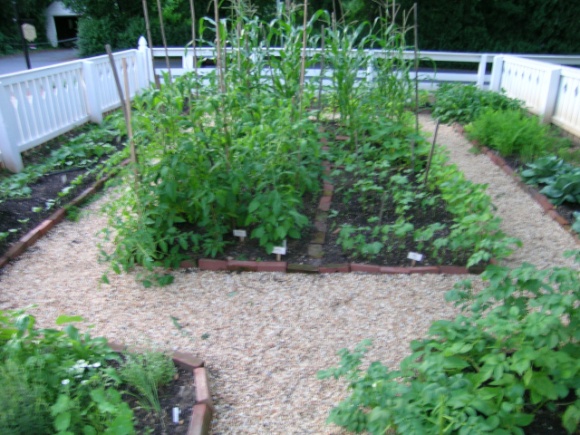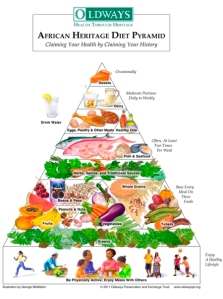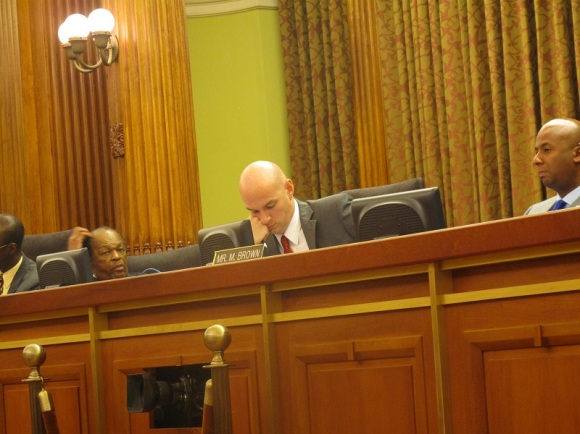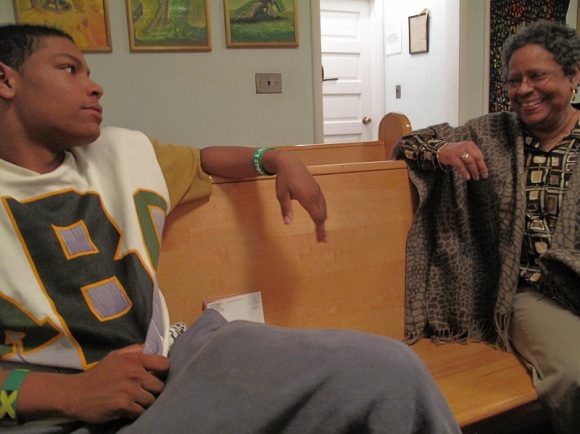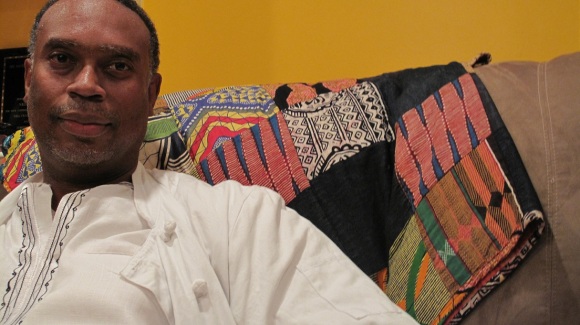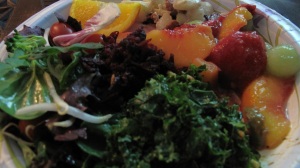As a special feature of DC Food Justice from Women’s History Month and National Nutrition Month, community leaders in the food justice movement will be showcased. This month’s focus is on the role of women in advocating from their communities to improve quality of life throughfood and nutrition.

Mariama looks for new vegetarian recipes.
A woman is like a tea bag. She only knows her strength when put in hot water. — Nancy Reagan
by Tambra Stevenson
Student across the country hold walkouts in protest of an unjust judicial system for the lack of arrest of Trayvon Martin’s killer. Yet Mariama Taifa-Seitu, 17, protests another unjust system that produces the food you put in your mouth: chicken! And that’s why she is this month’s featured food fighter on the frontline.
 According to the United States Environmental Protection Agency, poultry are fed diets mostly of corn and soybean meal with added vitamins and minerals in the U.S. And in Washington, DC with the number of carry-out stores selling buff fried chicken with mambo sauce, you shouldn’t be surprised that the poultry consumption in the U.S. has steadily increased since the 1900s. Back then chicken [known as the Gospel Bird in black churches] was eaten only on Sundays, now poultry is an everyday food affair. But can eating too much of this tech-produced bird harm your health?
According to the United States Environmental Protection Agency, poultry are fed diets mostly of corn and soybean meal with added vitamins and minerals in the U.S. And in Washington, DC with the number of carry-out stores selling buff fried chicken with mambo sauce, you shouldn’t be surprised that the poultry consumption in the U.S. has steadily increased since the 1900s. Back then chicken [known as the Gospel Bird in black churches] was eaten only on Sundays, now poultry is an everyday food affair. But can eating too much of this tech-produced bird harm your health?
Mariama was inspired to find the answer to this question. “I never ate red meat, only turkey and

Credit: J. Sell, Iowa State University
seafood. In my freshman year, I saw a video called ‘Eat Your Meat,’ I never thought about where meat comes from, the video shocked me and open my eyes about food safety and how our health can be linked to how animals are treated.”
In preparation for the food fight of her young life, the honor student volunteered with Compassion over Killing, a DC-based animal protection nonprofit, to improve her advocacy skills. In DuPont Circle she practiced how to conduct a feed-in, which involves ‘standing outside of a fast-food chain that practice unjust food practices.’
And with mentoring from the owner of Everlasting Life Cafe, Dr. Baruch BenYehudah, she gained focus: “For my senior year, I chose the topic of consumption of factory-farmed meats and the poor consumer health and have Dr. Baruch as my mentor.”

Courtesy photo
“I decided to stand outside of KFC to give free literature and vegetarian food while people signed the petition,” shared Mariama. “Unlike McDonald’s and Whole Foods, KFC doesn’t set animal welfare regulations among its distributors.” She learned about the campaign against KFC on PETA’s website.
Now a senior at School Without Walls, Mariama recently presented her student project entitled “Appetite for Disaster: The Correlation Between Factory Farm Meat and Human Health,” at the the Heb Peret – The Seed Festival™ and Food Sovereignty on March 24th in Baltimore, MD.
At the forum, she reveals her findings which show factory farms are hazardous to the public’s health. Based on the ‘increase of antibiotic-resistant bacterium, the rise of viruses and diseases, and the pollution of the air and water,’ she concludes that ‘society must consider alternative solutions to factory farms, such as organic farming and sustainable agriculture, or even veganism.’ In her report she goes on to say that ‘there are no health, environmental, or moral benefits to factory farms, and deeming the practice illegal would demonstrate positive effects locally and globally.’
With her new-found media attention and speaking engagements, Mariama expresses how the project has impacted her and her family. “Before this project, I was a vegetarian and now I am even more aware of the environmental impact and source of what I eat,” she tells me. “It was little overwhelming. Majority of my friends didn’t know [where meat was coming from], they may not stop eating meat but at least choose more organic and sustainable sources and getting people my age aware of food safety.”
After watching her video project and reading the report, her family is eating more vegetarian meals and getting locally grown vegetables from their neighbor. “We don’t read eat out that much except for vegetarian foods from Senbeb Café operated by Asurae Aset Society and located at 6224 3rd St., N.W. Washington, D.C. or from the Bethesda-based Vegetable Garden.”
Given the support from family, friends and teachers, she is well on her way to be an agent of change. And she articulates her gratitude: “I am happy that my mother has always been supportive for me in whatever I set my mind to…she has done a lot to help me through the process…she is great.”
Taking her experience to the next level, she attended the Corcoran College of Art + Design where she met international journalists. Blending her passion for social change, she completed a pre-college photojournalism program where her love of photos grew. Inspired by her instructor, she explains, “I am interested in social justice issues around the world.”
As an active globetrotting youth, she plans to capture ‘controversial issues in societies that people don’t think or talk about’ through her photo lens. Applying her knowledge, her next dream adventure involves going to Uganda where American doctors are testing experimental drugs on residents without informed consent.
And with her experience and passion, she will be a great fighter for injustice locally and globally. You can view her featured photographs at Ama Seitu Photography.
Tambra Stevenson is the President of the Student Dietetic Association at the University of the District of Columbia which is hosting the second Annual International Urban Sustainability Action Summit on April 27, 2012 at the Van Ness Campus. Stay abreast of food fights, follow her on Twitter @tambra. And share your comments on the blog posts that mean something to you!
